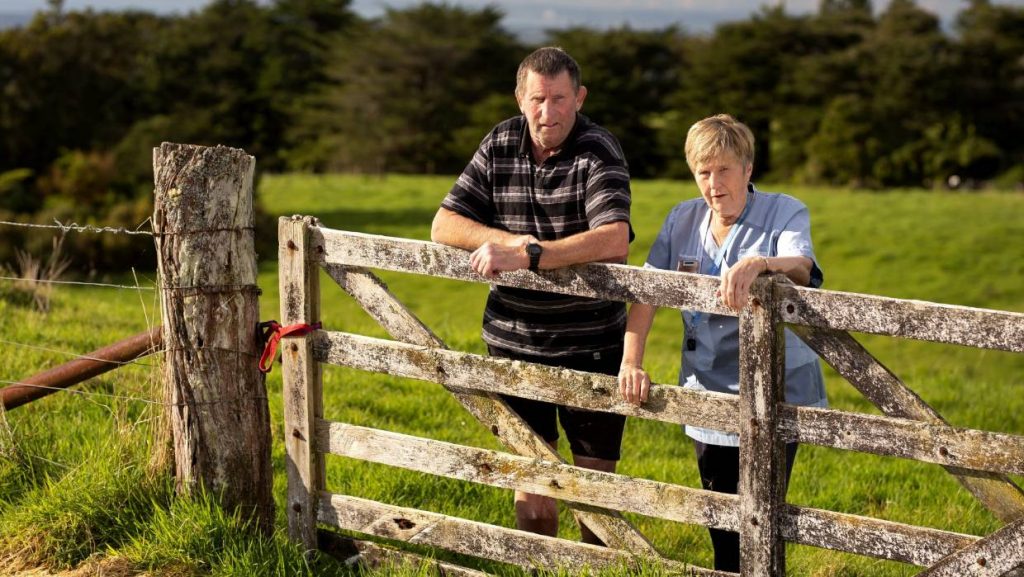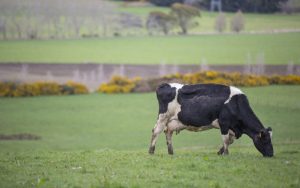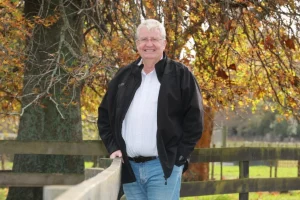
“We lost everything, were put on the street, jobless, cashless, nothing,” Linda Gray says.
STUFF
Gray Eatwell explains why New Zealand needs a farm debt mediation law.
It was not a peaceful receivership, with police having to be called in after allegations of assault against a TV journalist and a mediator by an employee of the receiver.
“We received a without-notice, court-approved order, the action and non-accountability of the bank’s agents was disgusting,” Gray says.
According to Rabobank, the amount the Grays owed was $5.6 million, although today she disputes whether the figure was that high.
A media release to the Taranaki Daily News at the time from the bank said it was forced to attain a High Court order to take over the property after actions were carried out by the Grays to “damage farm assets”.
It said these actions included the dumping of milk and followed a written threat to the bank from Kelvin Gray that he would cause long-term damage to the property.
“This made the situation untenable. Police were involved in the enforcement of this order to ensure the relocation could be completed peacefully,” Rabobank said.
While the rights and wrongs of receiverships can be debated, all parties are in agreement that there needs to be a better way of dealing with farmers who are struggling financially.
The Government has decided to set up a mediation system through the Ministry for Primary Industries. The estimated cost of establishing the scheme is $350,000, with an annual cost of $250,000 to $300,000.
It is expected each case of mediation will cost about $6000, which will be split between the lender and the farmer.
Some would like such a system to go further and cover all businesses. Insolvency specialist John Fisk believes the initiative is a good start and one which operates well where it exists in Australia.
Just how many farm bankruptcies there are is hard to say. One of the best indicators is mortgagee sales, which reached a peak of 128 in 2011, around the time of the global financial crisis. They have since tailed off to just 18 in 2017.
Corelogic senior property economist Kelvin Davidson argues banks do not want to go down the bankruptcy route and would much rather work with farmers, but in some cases have no choice.
However rural mediator and Labour candidate for Kaikoura Janette Walker, who made a name defending farmers against banks over loan swaps, does not spare them.
“Banks are actively wanting to get farmers off their properties. What people don’t understand is the banks have capital adequacy ratios they have to meet for the Reserve Bank. When the ratio gets too narrow, between what they lent out and what they’ve got in the bank, they start looking at the bottom 25 per cent of all borrowings. They ask: ‘Who can we get rid of?’ It’s as hard hearted as that, and then they start proceedings to get rid of them,” Walker says.
The banks did not actually make farmers bankrupt but created “technical defaults” and got them to fold up their business and voluntarily walk off their land.
Walker says the banks used the euphemism of “having a courageous conversation going forward”. Instead of farmers dealing with a local branch manager, they were placed with strategic central-based management who are completely different people, “they’re pretty hard core and they don’t care what happens”.
Recently ANZ wrote to its rural customers imposing a 0.75 per cent fee on overdrafts, with the Reserve Bank’s proposed capital requirements a factor in the move.
NZ First MP Mark Patterson says for every official mortgagee sale, there are multiple times when farmers are “managed off quietly”.
“In all those scenarios there is a significant power imbalance between farmer and the bank so often the deals they agree to are under duress.”
He says there is anecdotal evidence that Australian banks are worried about their high exposure to the Kiwi farming market, and are systematically pulling back.
“Overseas experience shows us that when these schemes [mediation] are rolled out they are well used. I understand the recent Royal Commission into Banking in Australia commended the NSW scheme and recommended it be rolled out nationwide. The banks here in New Zealand have also backed the scheme as have Federated Farmers.”
Rabobank chief executive Todd Charteris welcomes the mediation measure, saying the legislation would formalise the approach it already took. It provides “a degree of flexibility in restructuring loans and repayment schedules”.
Federated Farmers vice-president Andrew Hoggard says mediation will be a useful tool, as its banking surveys show the banks are applying higher levels of pressure.
Mortgagee sales have fallen because there are fewer buyers and banks do not want to collapse the land market by forcing sales.
“But they are still changing conditions and generally making it tougher for farmers. It’s becoming a hard grind rather than simply exiting people,” Hoggard says.
Walker believes banks are partly to blame for the situation farmers find themselves in.
“They lent them the money in the first place. It’s all very well to turn around and say ‘the farmer’s useless, he doesn’t know how to budget’, well you lend him millions of dollars, he doesn’t change the kind of person he is overnight.
“The banks could be done for taking unfair advantage of people who aren’t financially savvy. I’ve had some farmers who didn’t know what an overdraft facility is or how to balance their cheque books.”
Now a nurse in the emergency department of Taranaki Base Hospital, Linda Gray sees trauma in her job daily.
But the trauma she experienced in her own life has left its mark. No longer living with Kelvin Gray, she says her grievances have never been properly heard, and the hurt from the day she was tossed on the street lingers to this day.
























